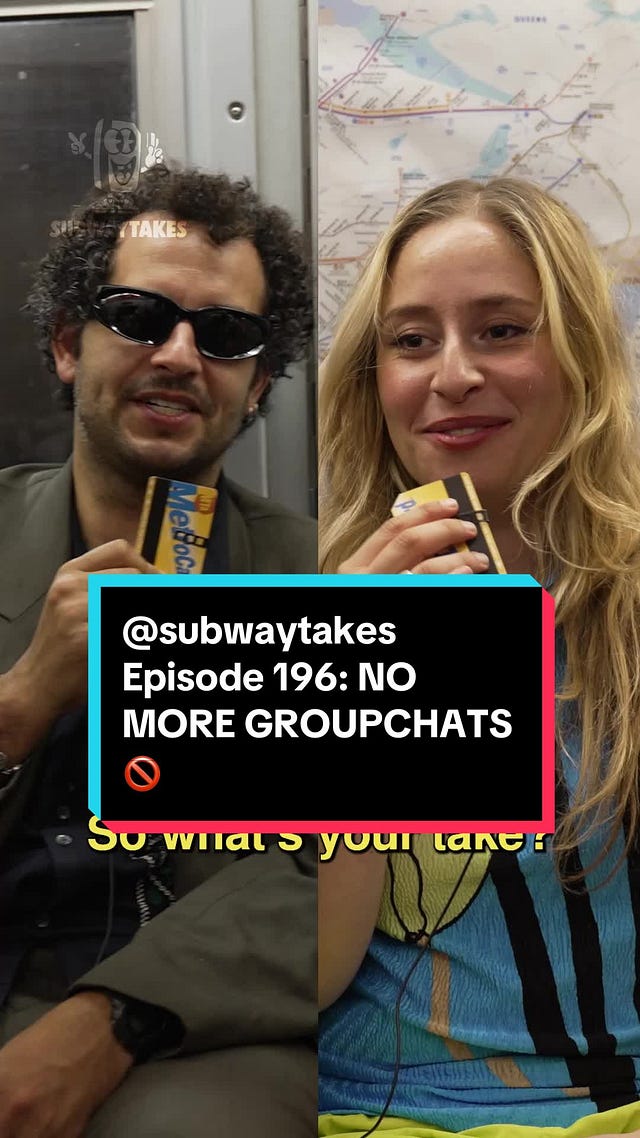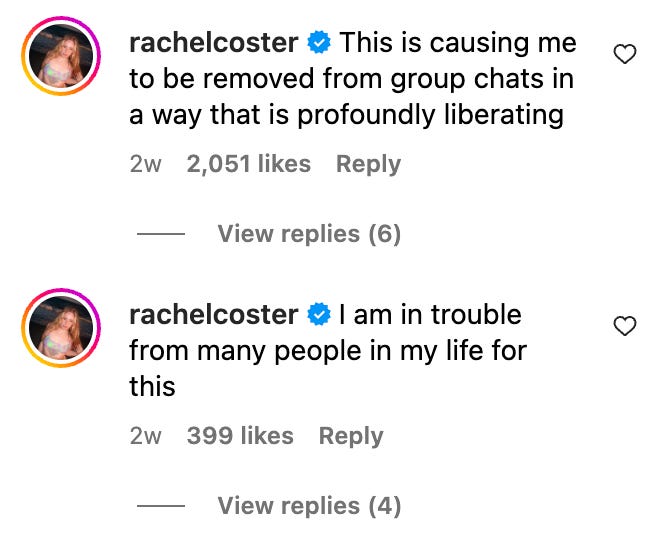Is It Time to Leave the Group Chat for Good?
Once the heart of our digital friendships, group chats have become a source of exhaustion and performative connection.
In an episode of The Secret Lives of Mormon Wives, drama ensues (or doesn’t, really) when Whitney Leavitt "leav-itts" the #MomTok group chat—for good. Her exit becomes a plotline and an alleged cry for attention, though she claims it was actually in pursuit of peace. It might seem like a silly moment on a reality TV show, but it resonated with me. Frankly, there are plenty of group chats I’d love to leave, but for one reason or another, I feel like I can’t.

I remember when group chats felt exciting, a social space for me and my friends—whether we were people who traveled together, attended a dinner party, or used to work at the same company. But now? They’ve morphed into anchors, pulling me into conversations I no longer have the time or energy for. They’ve become digital purgatories—easy to create, but nearly impossible to escape, with no clear social rules on when or how to leave. They are pure symbols of our always-on, connected times.
This feeling isn’t personal—it's a reflection of how digital spaces are shifting for all of us. I came across a video of Rachel Coster on SubwayTakes—a quick, raw series filmed on the NYC subway where people are asked for their hot takes. Her take, respectfully, we need to kill the group chat. It made me think: Are group chats still about connection, or are they just a performance of it?
 Tiktok failed to load.
Tiktok failed to load.Enable 3rd party cookies or use another browser
It’s a good question. When did group chats, our modern-day social circles, become so exhausting? Paul and I explored the topic on the latest episode of our podcast, Send Me The Link.
The Backbone of Digital Intimacy?
If you're like me, your phone is constantly buzzing with messages, memes, and logistical plans that once felt fun but now feel overwhelming. Group chats started as a refuge—a space to escape the performative nature of public social media. It was the perfect antidote to the polished, curated, anxiety-inducing feeds of Instagram or Twitter (I will never call it X!!!!!!). Instead, you could have unguarded, messy, and honest conversations with people who got you. You could pop in and out, sprinkle in a reaction gif, or share your latest crush without worrying about what the rest of the world thought.
But then, things shifted (and the number of group chats multiplied). They were supposed to hold our friendships together, but now they stretch them thin. What was once convenience has turned into a feeling of unease and discomfort.
Group chats have evolved (or devolved) into sprawling arenas of social upkeep, where we’re expected to keep up with memes, toss out hot takes, and make sure we don’t “leave anyone on read.” How many times have you been fully engaged in real life, only to return to your phone and find 254 missed messages—where 4 of the 9 members are deep in the weeds of coordinating plans?
At this point, group chats feel less like intimacy and more like a constant feed we’re supposed to monitor. The exhaustion comes not from the chat itself but the expectation of presence. You’re always on—but are you really there?
The Double-Edged Sword of Group Chats
SubwayTakes’ video echoes a feeling we’ve all had but rarely articulated: group chats are both our lifeline and our limbo. We tell ourselves we’re maintaining connection, but what’s really happening is the slow erosion of boundaries. It's FOMO mutated and amplified.
As their popularity expanded, they began to blur the lines between connection and obligation. There’s a fine line between staying close to people and feeling like you’re constantly tethered to them. The endless notifications make us feel tethered, not connected, and the pressure to stay relevant in these spaces is exhausting. Does their existence mean we’re still friends, or are we just performing the role?
Maybe group chats aren’t about conversation at all. Maybe they’re about virtual presence—proving you’re still there, still relevant, still in the loop. And when you’re not the one responding? That’s a whole other spiral.
There’s a reason SubwayTakes resonates—because it’s raw, it’s real, and it’s pulling back the curtain on how we actually feel about the digital rituals we’ve normalized. It exposes a collective exhaustion with the constant need to perform the connection. It’s a glimpse into our collective exhaustion with modern connection.
The Social Politics of the Group Chat
Not all group chats are created equal. There’s a hierarchy even in the bubbles. You’ve got the oversharers, the ones who never reply, the ones who dominate the conversation but never actually say much. There’s an unspoken set of rules we all follow, but at what cost? Group chats can make us feel like we’re all part of the same social circle, but they also dilute real connections. Are we talking to our friends, or are we just talking to the void?
There’s also the digital bystander effect. The more people in a chat, the less likely anyone is to actually engage meaningfully. You watch, you scroll, but rarely do you jump in. And that, my friends, is how digital intimacy dies—not with a bang but with a thousand unread messages.
And what happens when you’re the one who leaves? No one wants to be that person—the one who abandons the thread, the memories, the in-jokes. It feels like leaving the chat means you’re leaving the friendship, too. And yet, staying feels just as hard.
Should We End Group Chats?
Could we go back to a time without them? I don’t think we can. They’re too ingrained in how we connect, but I also think there’s a way to do it better. Maybe we don’t need to kill group chats entirely, but we do need to rethink them. Maybe it’s time to be brave. Maybe it's time to reclaim our peace from the endless notifications. Paul suggested we do it on November 1st, as a group, creating a Group Chat Amnesty Day (à la Email Debt Forgiveness Day, RIP Reply All <3). It could be the first step toward a healthier way to connect.
Are group chats still saving your social life, or are they just adding to your digital burnout? Maybe it’s time we all take a break from the pings and reclaim our peace.
And if you have? Honestly, good for you.
Send Me The Link is a podcast about cultural trends, digital dilemmas, and internet obsessions, unpacked one link at a time by myself and my friend / mentor / internet friend turned real-life homie PK Lawton. In this episode, we dive into the world of group chats and how they’ve gone from essential to exhausting.
Give us a listen ❤️



